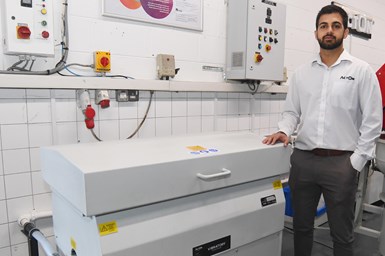ActOn Finishing Installs Vibratory Finishing System for Rolls-Royce Bristol
The system has provided an improved method for parts cleaning, increasing throughput and saving water.

Sid Gulati, operations director at ActOn Finishing, with one of the firm’s vibratory finishing systems.
UK-based ActOn Finishing has installed a vibratory finishing system at Rolls-Royce Bristol to improve its cleaning process and increase productivity. The new system is said to enable the engine manufacturer to process three times more volume in a shorter time frame.
ActOn was contacted by the manufacturer to look at improving cleaning during its shelling process, which leaves a buildup of ceramic slurry on the equipment used. ActOn carried out live trials at its facility and found that the vibratory finishing machine was the right solution to clean parts quickly and consistently.
The machine, designed and manufactured by ActOn Finishing, has now been installed at Rolls-Royce Bristol, reducing the process time from 60 minutes to 10 minutes and enabling the firm to clean three times more equipment at once. The finishing machine has also reduced the firm’s water consumption while still achieving a cleaner finish.
Sid Gulati, operations director at ActOn Finishing, says that his firm has had a long-standing relationship with Rolls-Royce, having done subcontract polishing for the company for a number of years. “They contacted us about a problem that they were having with their cleaning processes, and although this kind of application was new to us, we were able to conduct trials and find a solution for the client.”
Henry Illsley, shell process engineer at Rolls-Royce Bristol, said: “ActOn were quick to develop a solution for the shell cleaning system. The machine has improved our throughput significantly and we are pleased with the quality of machine that they have manufactured and installed.”
Related Content
-
From Drain to Gain with Smart Wastewater Recovery
Incorporating digital monitoring to maximize performance.
-
Improving Wastewater Management Efficiency
Don’t find yourself underwater when managing wastewater processes. Follow these steps to improve efficiency and determine the best ROI.
-
Corrosion Resistance Testing for Powder Coating
Salt spray can be useful to help compare different pretreatment methods and coatings but it does not tell us much about the corrosion resistance of a part over time in the field. Powder coating expert Rodger Talbert offers insights into how to get a better idea of how to improve a part’s corrosion resistance in the real world.















